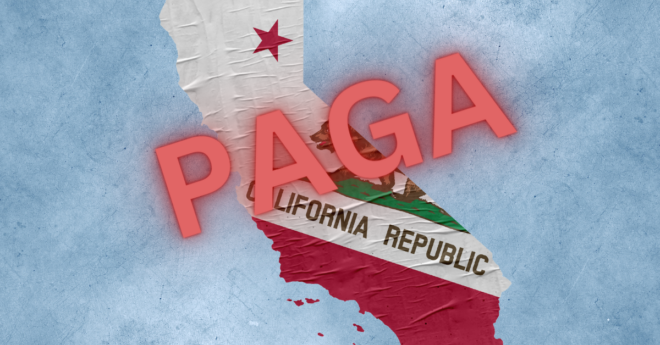As recently covered on this blog, the surge in Private Attorneys General Act (PAGA) lawsuits and the amounts of damages sought in these cases in California has become a significant cause for concern among the business community. PAGA, initially designed to empower employees to file lawsuits for labor code violations on behalf of themselves and other workers, has seen a dramatic increase in its application. This uptick has not only heightened the legal and financial pressures on companies across various industries but also raised questions about the broader implications for the state’s business environment. The California Supreme Court decided a key issue in Estrada v. Royalty Carpet Mills, Inc., regarding whether a trial court has discretion to limit PAGA cases that are unmanageable. Here are five key issues California employers need understand about the Estrada decision:
1. Background of PAGA
PAGA became law in 2004 to authorize aggrieved employees to file lawsuits against employers on behalf of themselves, other employees, and on behalf of the State of California for Labor Code violations. PAGA allows aggrieved employees to act as a “Private Attorneys General” to seek remedies against their employer not only for the violations committed against them, but also to recover any violations committed by their employer against other employees. The statute was intended “to punish and deter employer practices that violate the rights of numerous employees under the Labor Code.” Iskanian v. CLS Transportation Los Angeles, LLC (2014). The plaintiff’s ability to bring claims on behalf of other employees is referred to as “non-individual claims.” PAGA is “simply a procedural statute allowing an aggrieved employee to recover civil penalties … that otherwise would be sought by state labor law enforcement agencies.” Amalgamated Transit Union, Local 1756, AFL-CIO v. Superior Court (2009). As the California Supreme Court explained in Estrada v. Royalty Carpet Mills, a PAGA plaintiff “represents a single principal, the [Labor and Workforce Development Agency] LWDA, that has a multitude of claims.” Therefore, nonparty employees and the California government are bound by PAGA judgments, nonparty employees are not bound as to “remedies other than civil penalties.”
Civil penalties recovered under PAGA are split: 75% of the penalties go to the state, and 25% go to the aggrieved employees.
2. Supreme Court issue being reviewed in Estrada v. Royalty Carpet Mills, Inc.
The issue in Estrada was: Do trial courts have inherent authority to ensure that claims under the Private Attorneys General Act (Lab. Code, § 2698 et seq.) will be manageable at trial, and to strike or narrow such claims if they cannot be managed?
The California Supreme Court’s answer: No. The California Supreme Court explained, “striking a PAGA claim on manageability grounds alone, as the trial court did in this case, is inconsistent with a plaintiff’s statutory right to bring such a [PAGA] claim and is beyond a trial court’s inherent authority.” This decision resolved a split in authority between two cases: Wesson v. Staples of the Offices Superstore, LLC and Estrada v. Royalty Carpet Mills, Inc.
3. Distinction between class actions and PAGA suits.
The California Supreme Court explained in Estrada that a PAGA suit, while it is brought on behalf of all aggrieved employees, is procedurally different than a class action. A class-action plaintiff can “raise a multitude of claims because he or she represents a multitude of absent individuals; a PAGA plaintiff, by contrast, represents a single principal, the [Labor and Workforce Development Agency] LWDA, that has a multitude of claims.” Therefore, the due process rights of third parties are “not paramount.”
Moreover, under federal law and California law, “manageability” is a factor used to determine whether a class action can be certified. For example, the California Supreme Court in Duran v. U.S. Bank National Assn. (2014), held: “In certifying a class action, the court must also conclude that litigation of individual issues, including those arising from affirmative defenses, can be managed fairly and efficiently. ‘[W]hether in a given case affirmative defenses should lead a court to approve or reject certification will hinge on the manageability of any individual issues.’ In wage and hour cases where a party seeks class certification based on allegations that the employer consistently imposed a uniform policy or de facto practice on class members, the party must still demonstrate that the illegal effects of this conduct can be proven efficiently and manageably within a class setting.” However, the California Legislature did not write any type of manageability requirement into the “detailed statutory requirements for maintaining a PAGA claim.”
4. Even though trial courts lack power to dismiss PAGA claims because of manageability, they have other tools to manage PAGA cases.
The Court in Estrada explained that even though trial courts do not have the inherent authority to strike PAGA claims on manageability grounds alone, there are tools trial courts have to manage PAGA cases, such as:
- Discretion in setting what penalties, if any, to award to plaintiff;
- May limit witness testimony and other forms of evidence when determining the number of violations that occurred and the amount of penalties;
- May limit the scope of the PAGA claim; and
- May issue substantive rulings, including but not limited to, demurrers, motion for summary judgment or judgment notwithstanding the verdict in cases in which a plaintiff is unable to meet their burden of proof or pleads the claim in an overbroad or unspecific manner.
5. 2024 Ballot Initiative to reform PAGA
On another front, PAGA faces a battle for survival directly from the voters of California. The California Fair Pay and Employer Accountability Act aims to replace PAGA. This initiative has garnered enough signatures to secure a spot on the November 2024 ballot. If approved, it would allow employees to receive 100% of the penalties collected, a significant increase from the current 25% allocation. Additionally, it proposes to prohibit the awarding of attorneys’ fees in such cases and to double the penalties for employers who knowingly violate the law. More details about the initiative are available on the Californians for Fair Pay and Accountability website.





